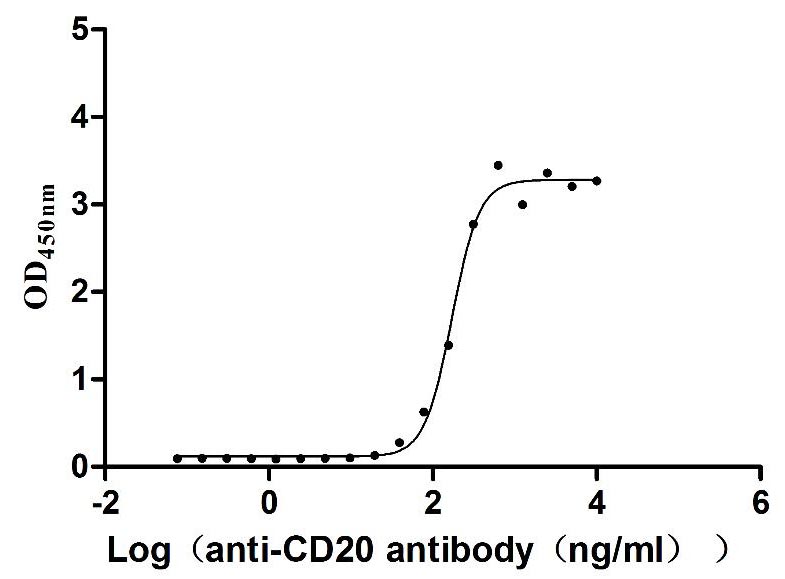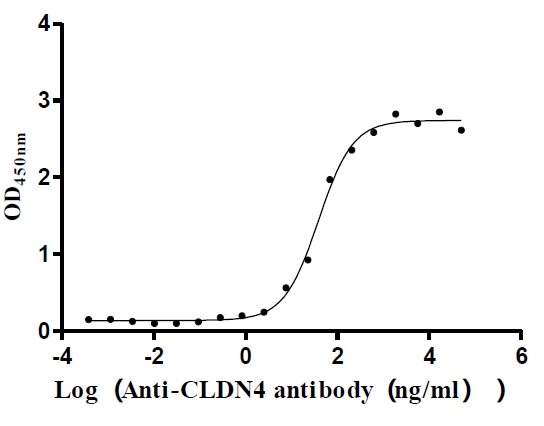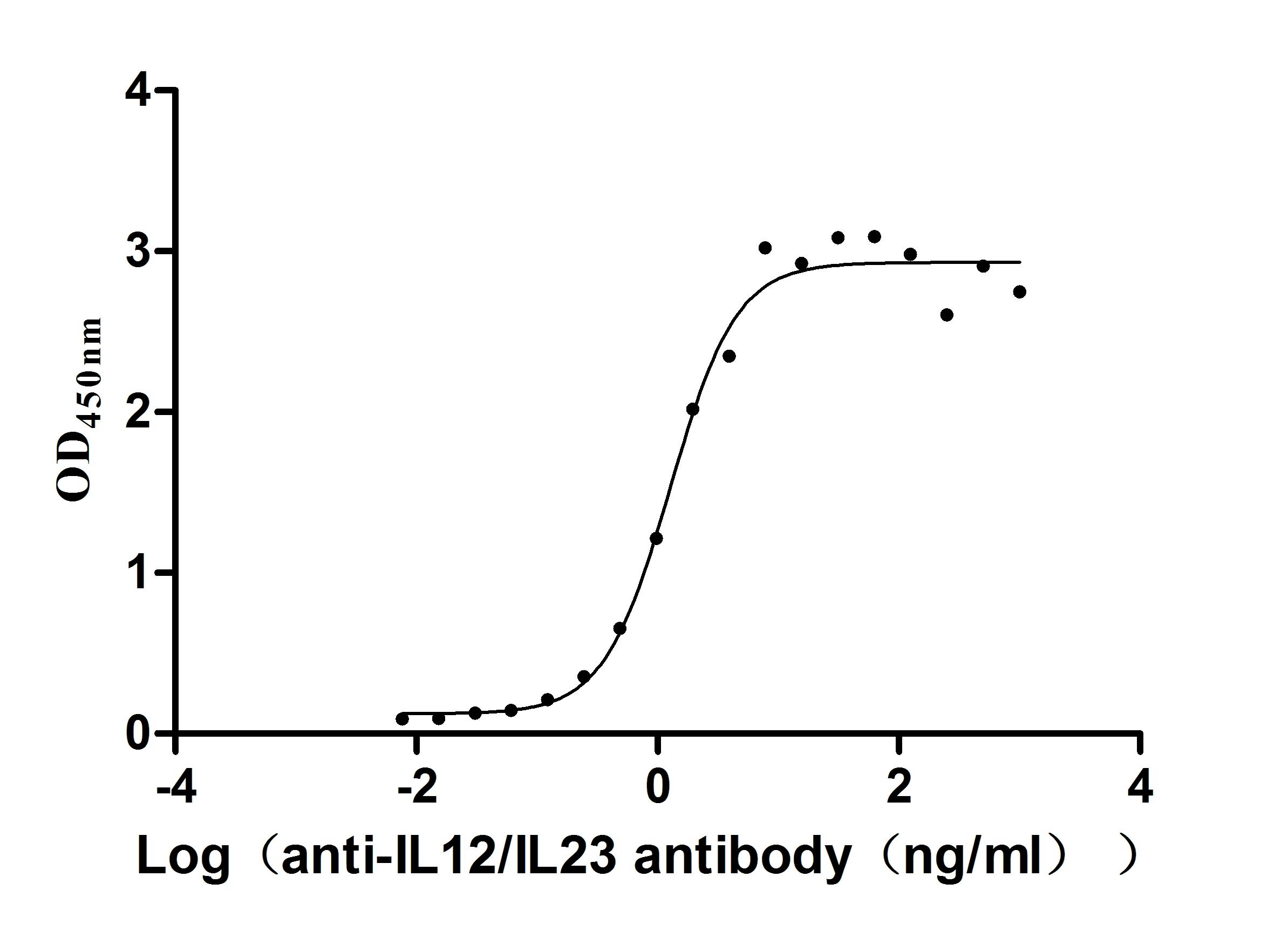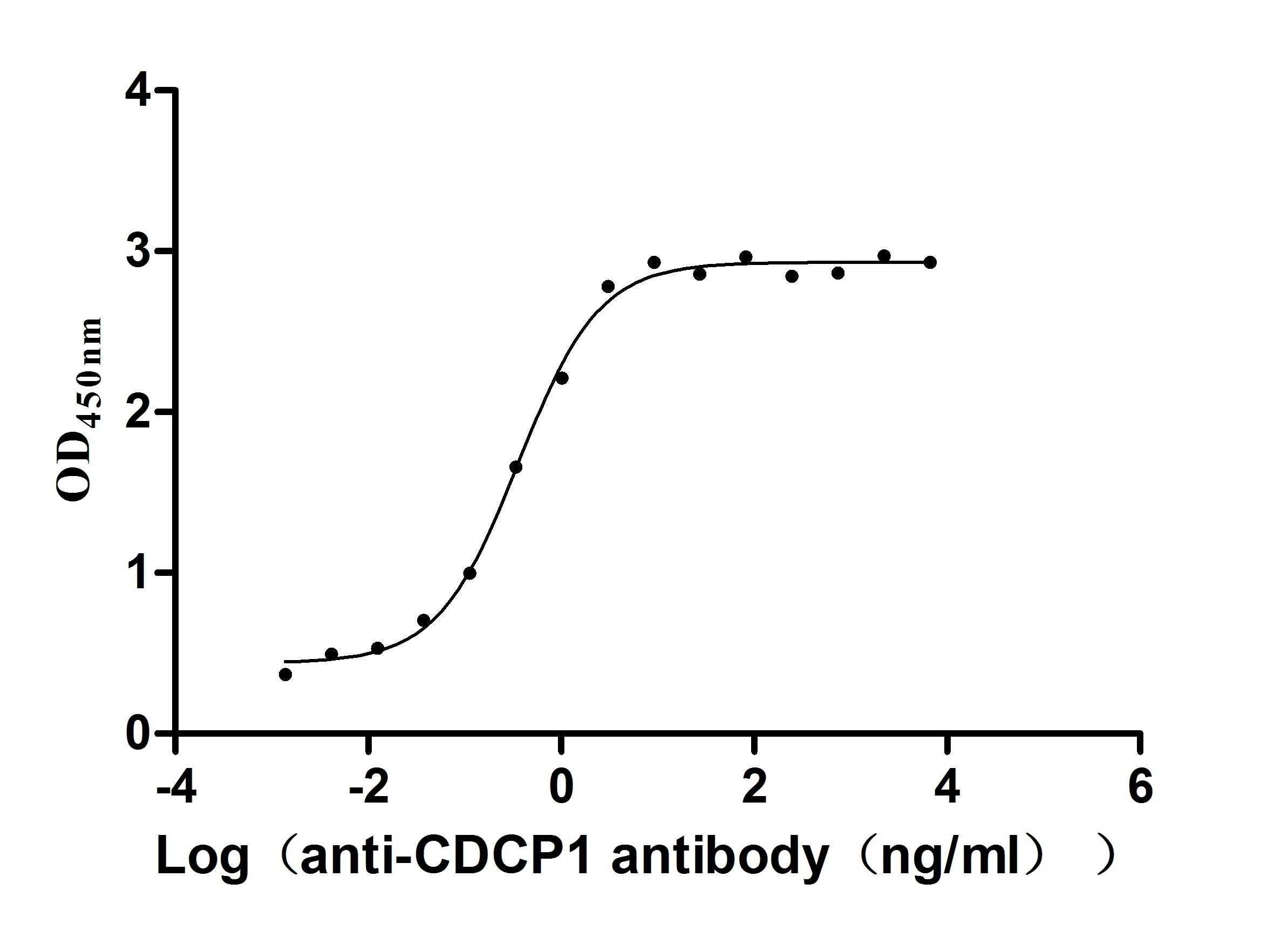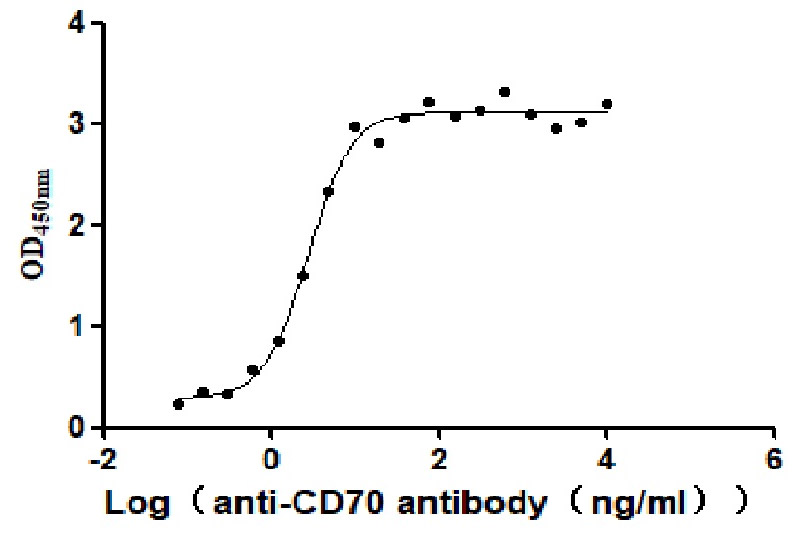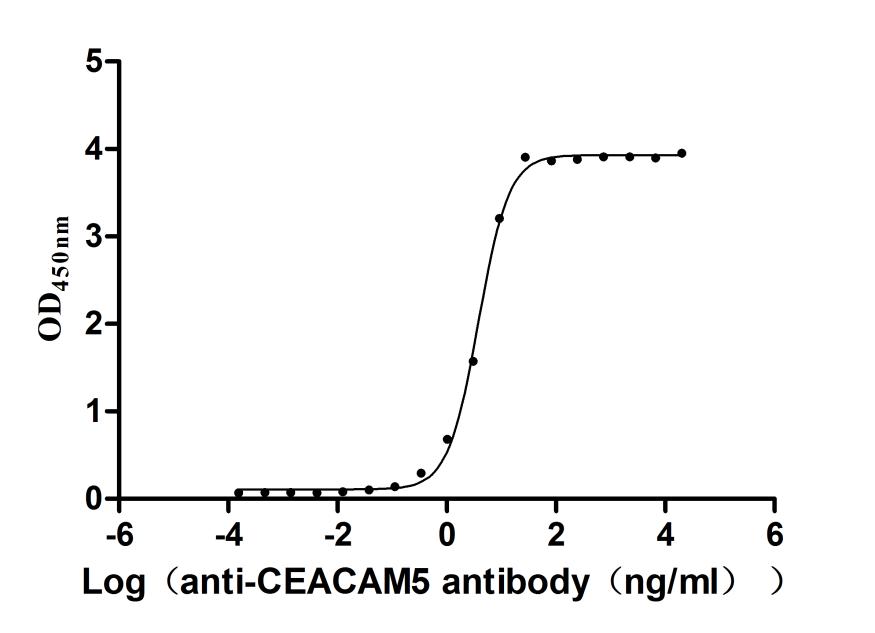Recombinant Mouse Apoptosis-associated speck-like protein containing a CARD (Pycard)
-
货号:CSB-YP861664MO
-
规格:
-
来源:Yeast
-
其他:
-
货号:CSB-EP861664MO-B
-
规格:
-
来源:E.coli
-
共轭:Avi-tag Biotinylated
E. coli biotin ligase (BirA) is highly specific in covalently attaching biotin to the 15 amino acid AviTag peptide. This recombinant protein was biotinylated in vivo by AviTag-BirA technology, which method is BriA catalyzes amide linkage between the biotin and the specific lysine of the AviTag.
-
其他:
-
货号:CSB-BP861664MO
-
规格:
-
来源:Baculovirus
-
其他:
-
货号:CSB-MP861664MO
-
规格:
-
来源:Mammalian cell
-
其他:
产品详情
-
纯度:>85% (SDS-PAGE)
-
基因名:
-
Uniprot No.:
-
别名:Pycard; AscApoptosis-associated speck-like protein containing a CARD; mASC; PYD and CARD domain-containing protein
-
种属:Mus musculus (Mouse)
-
蛋白长度:full length protein
-
表达区域:1-193
-
氨基酸序列MGRARDAILD ALENLSGDEL KKFKMKLLTV QLREGYGRIP RGALLQMDAI DLTDKLVSYY LESYGLELTM TVLRDMGLQE LAEQLQTTKE ESGAVAAAAS VPAQSTARTG HFVDQHRQAL IARVTEVDGV LDALHGSVLT EGQYQAVRAE TTSQDKMRKL FSFVPSWNLT CKDSLLQALK EIHPYLVMDL EQS
-
蛋白标签:Tag type will be determined during the manufacturing process.
The tag type will be determined during production process. If you have specified tag type, please tell us and we will develop the specified tag preferentially. -
产品提供形式:Lyophilized powder
Note: We will preferentially ship the format that we have in stock, however, if you have any special requirement for the format, please remark your requirement when placing the order, we will prepare according to your demand. -
复溶:We recommend that this vial be briefly centrifuged prior to opening to bring the contents to the bottom. Please reconstitute protein in deionized sterile water to a concentration of 0.1-1.0 mg/mL.We recommend to add 5-50% of glycerol (final concentration) and aliquot for long-term storage at -20℃/-80℃. Our default final concentration of glycerol is 50%. Customers could use it as reference.
-
储存条件:Store at -20°C/-80°C upon receipt, aliquoting is necessary for mutiple use. Avoid repeated freeze-thaw cycles.
-
保质期:The shelf life is related to many factors, storage state, buffer ingredients, storage temperature and the stability of the protein itself.
Generally, the shelf life of liquid form is 6 months at -20°C/-80°C. The shelf life of lyophilized form is 12 months at -20°C/-80°C. -
货期:Delivery time may differ from different purchasing way or location, please kindly consult your local distributors for specific delivery time.Note: All of our proteins are default shipped with normal blue ice packs, if you request to ship with dry ice, please communicate with us in advance and extra fees will be charged.
-
注意事项:Repeated freezing and thawing is not recommended. Store working aliquots at 4°C for up to one week.
-
Datasheet :Please contact us to get it.
相关产品
靶点详情
-
功能:Functions as key mediator in apoptosis and inflammation. Promotes caspase-mediated apoptosis involving predominantly caspase-8 and also caspase-9 in a probable cell type-specific manner. Involved in activation of the mitochondrial apoptotic pathway, promotes caspase-8-dependent proteolytic maturation of BID independently of FADD in certain cell types and also mediates mitochondrial translocation of BAX and activates BAX-dependent apoptosis coupled to activation of caspase-9, -2 and -3. Involved in macrophage pyroptosis, a caspase-1-dependent inflammatory form of cell death and is the major constituent of the ASC pyroptosome which forms upon potassium depletion and rapidly recruits and activates caspase-1. In innate immune response believed to act as an integral adapter in the assembly of the inflammasome which activates caspase-1 leading to processing and secretion of proinflammatory cytokines. The function as activating adapter in different types of inflammasomes is mediated by the pyrin and CARD domains and their homotypic interactions. Required for recruitment of caspase-1 to inflammasomes containing certain pattern recognition receptors, such as NLRP2, NLRP3, AIM2 and probably IFI16. In the NLRP1 and NLRC4 inflammasomes seems not be required but facilitates the processing of procaspase-1. In cooperation with NOD2 involved in an inflammasome activated by bacterial muramyl dipeptide leading to caspase-1 activation. May be involved in DDX58-triggered proinflammatory responses and inflammasome activation. In collaboration with AIM2 which detects cytosolic double-stranded DNA may also be involved in a caspase-1-independent cell death that involves caspase-8. In adaptive immunity may be involved in maturation of dendritic cells to stimulate T-cell immunity and in cytoskeletal rearrangements coupled to chemotaxis and antigen uptake may be involved in post-transcriptional regulation of the guanine nucleotide exchange factor DOCK2; the latter function is proposed to involve the nuclear form. Also involved in transcriptional activation of cytokines and chemokines independent of the inflammasome; this function may involve AP-1, NF-kappa-B, MAPK and caspase-8 signaling pathways. For regulation of NF-kappa-B activating and inhibiting functions have been reported. Modulates NF-kappa-B induction at the level of the IKK complex by inhibiting kinase activity of CHUK and IKBK. Proposed to compete with RIPK2 for association with CASP1 thereby down-regulating CASP1-mediated RIPK2-dependent NF-kappa-B activation and activating interleukin-1 beta processing. Modulates host resistance to DNA virus infection, probably by inducing the cleavage of and inactivating CGAS in presence of cytoplasmic double-stranded DNA.
-
基因功能参考文献:
- ASC has a role in the regulation of renal fibrosis and endoplasmic reticulum stress after unilateral ureter obstruction, strongly indicating that ASC could serve as an attractive target in the treatment of chronic kidney disease PMID: 30057487
- both Nlrp3(-/-) and Asc(-/-) mice showed a strongly improved host defense, as reflected by a markedly reduced mortality rate accompanied by diminished bacterial growth and dissemination. PMID: 28971472
- Cl(-) channel-dependent formation of dynamic ASC oligomers and inflammasome specks that remain inactive in the absence of K(+) efflux. Formed after Cl(-) efflux exclusively, ASC specks are NLRP3 dependent, reversible, and inactive, although they further prime inflammatory responses. PMID: 30232264
- we found that butyrate significantly decreased Nlrp3 inflammasome formation and activation in the carotid arterial wall of wild type mice (Asc(+/+)), which was comparable to the effect of gene deletion of the adaptor protein apoptosis-associated speck-like protein gene (Asc(-/-)). PMID: 29475132
- oligomerization of ASC creates a multitude of potential caspase-1 activation sites, thus serving as a signal amplification mechanism for inflammasome-mediated cytokine production PMID: 27329339
- Collectively, these results are consistent with a model whereby the type III secretion system apparatus of Pseudomonas aeruginosa activates the caspase-1-dependent inflammasome and caspase-3/7 through an ASC-dependent mechanism. PMID: 29957172
- ASC specks released by microglia bind to amyloid-beta and increase amyloid-beta oligomer and aggregate formation, acting as an inflammation-driven cross-seed for amyloid-beta pathology PMID: 29293211
- results suggest that although Pyk2 and FAK are involved in inflammasome activation, only Pyk2 directly phosphorylates ASC and brings ASC into an oligomerization-competent state by allowing Tyr146 phosphorylation to participate ASC speck formation and subsequent NLRP3 inflammation. PMID: 27796369
- Alendronate (ALN)-augmented IL-1beta production and cell death require Smad3 and ASC activation, and SIS3 and anti-ASC antibodies may serve as palliative agents for necrotizing inflammatory diseases caused by ALN PMID: 29438662
- These data provide evidence that the inflammasome components ASC, NLRP3 and AIM2 play a role in regulating macrophage adhesion and activation in response to surface nanotopography and chemistry. PMID: 27188492
- SGLT-2 inhibition with dapagliflozin reduces the activation of the Nlrp3/ASC inflammasome and attenuates the development of diabetic cardiomyopathy in mice with type 2 diabetes. Effects are augmentated of the by DPP4 inhibitor Saxagliptin. PMID: 28447181
- Elevations of CO2 cause oligomerization of the inflammasome components ASC, NLRP3, caspase 1, thioredoxin interacting protein, and calreticulin - a protein from endoplasmic reticulum, leading to IL-1beta synthesis. An increased production rate of MPs containing elevated amounts of IL-1beta persists for hours after short-term exposures to elevated CO2 PMID: 28288918
- Our cumulative findings indicate that ASC suppresses cancer metastasis and progression via the modulation of cytoskeletal remodeling and the Src-caspase-8 signaling pathway. PMID: 27350283
- these findings suggest that p205 controls expression of Asc mRNA to regulate inflammasome responses. These findings expand on our understanding of immune-regulatory roles for the PYHIN protein family. PMID: 28931603
- this study shows that ASC-dependent Inflammasomes do not shape the commensal gut microbiota composition PMID: 28801232
- Our data identify RIPK3 and the ASC inflammasome as key tumor suppressors in AML. PMID: 27411587
- Data show that T cell-intrinsic PYD and CARD domain containing protein ASC is required for TH17-mediated experimental autoimmune encephalomyelitis (EAE). PMID: 26998763
- report herein that lack of ASC does not confer preferential protection in response to P. aeruginosa acute infection and that ASC(-/-) mice are capable of producing robust amounts of IL-1beta comparable with C57BL/6 mice PMID: 26472815
- These data identify a novel non-canonical immunoregulatory function of NLRP3 and ASC in autoimmunity. PMID: 25135254
- a significant role for NLRP3 and ASC in prion pathogenesis PMID: 25671600
- ASC-driven caspase-1 autoprocessing and speck formation are dispensable for the activation of caspase-1 and the NLRP1b inflammasome. PMID: 24492532
- IKKalpha controls the inflammasome at the level of the adaptor molecule ASC, which interacts with IKKalpha in the nucleus of resting macrophages in an IKKalpha kinase-dependent manner. PMID: 25266676
- Hypoxia-induced elevated right ventricular pressure and remodeling were attenuated in mice lacking the inflammasome adaptor protein ASC, suggesting that inflammasomes play an important role in the pathogenesis of pulmonary hypertension. PMID: 26071556
- gene deficiency results in absence of IL-1beta maturation in the middle ear response to non-typeable Haemophilus influenza, and in reduction of both leukocyte infiltration and macrophage phagocytosis PMID: 24652041
- Data (including data from studies using knockout mice) suggest that Asc is required for macrophage activation and inflammasome-dependent secretion of interleukin 1beta from peritoneal macrophages upon exposure to silica particles. PMID: 25522817
- NLRP3/ASC inflammasome promotes T-cell-dependent immune complex glomerulonephritis by canonical and noncanonical mechanisms. PMID: 24805106
- caspase-1/ASC inflammasomes play a significant role in the activation of IL-1beta/ROS and NF-kappaB signaling of cytokine gene expression for T. cruzi control in human and mouse macrophages. PMID: 25372293
- AIM2 and NLRC4 inflammasomes contribute with ASC to acute brain injury independently of NLRP3 PMID: 25775556
- Transcriptome analysis of adipocytes implicates the NOD-like receptor pathway (NLRP3, PYCARD) in obesity-induced adipose inflammation. PMID: 25011057
- These results reveal a limited role for ASC and NLRP3 during in vivo S. Typhimurium infection despite its role in cytokine maturation. PMID: 25115174
- Data indicate that Lyme arthritis is apoptosis-associated speckle-like protein ASC- and caspase-1-dependent, but independent of NLRP3 protein. PMID: 23148704
- Data indicate that apoptosis-associated speck-like protein containing a caspase recruitment domain (ASC) is highly expressed in medulloblastomas. PMID: 24469054
- these results suggest that ASC plays a detrimental role in lethal L. monocytogenes infection through IL-18 production in an inflammasome-dependent and -independent manner. PMID: 25251560
- The NLRP3/ASC/caspase-1 axis participates in the regulation of pro-imflammatory cytokine secretion in RAW264.7 macrophages. PMID: 24789624
- Apoptosis-associated speck-like protein containing a caspase recruitment domain was specifically up-regulated in collecting duct (CD) epithelial cells of the unilateral ureteral obstruction-treated kidney. PMID: 24606883
- Identify a novel innate immune signaling pathway (NLRP3-ASC-caspase-1-IL-1beta) activated by Ni(2+). PMID: 24158569
- phagocytosis of ASC specks by macrophages induced lysosomal damage and nucleation of soluble ASC, as well as activation of IL-1beta in recipient cells. PMID: 24952505
- ASC contributes to antibacterial defense during pneumococcal pneumonia. PMID: 24164497
- Confocal microscopic and co-immunoprecipitation analysis showed that the HFD enhanced the formation of inflammasome associated with Asc in podocytes as shown by colocalization of Asc with Nod-like receptor protein 3 PMID: 24508291
- ASC acts as an inflammatory response-associated gene by regulating caspase-1 activation and IL-1beta and IL-6 secretion, which may correlate with its biological effects. PMID: 23064768
- ASC controls IFN-gamma levels in an IL-18-dependent manner in caspase-1-deficient mice infected with Francisella novicida. PMID: 23975862
- These data suggest that ASC inflammasomes are critical determinants of host resistance to infection with T. cruzi PMID: 23966627
- ASC/caspase-1/IL-1beta signaling promotes HMGB1 induction to facilitate a TLR4-dependent inflammatory phenotype leading to ischemia-reperfusion hepatocellular damage. PMID: 23408710
- Brucella is sensed by ASC inflammasomes that collectively orchestrate a robust caspase-1 activation and proinflammatory response. PMID: 23460746
- Data indicate that Legionella activation of caspase-11 stimulated activation of caspase-1 through PYRIN domain-containing protein 3 (NLRP3) and apoptosis-associated speckle-like protein (ASC). PMID: 23307811
- Data show that bee venom detected by inflammasome and trigger activation of caspase-1 and secretion of proinflammatory cytokine IL-1beta is pyrin domain-containing 3 NLRP3, apoptosis-associated speck-like protein ASC, and IL-1 receptor dependent. PMID: 23297192
- ASC is an essential modulator of inflammasome-dependent and -independent immune responses to effectively control West Nile virus infection. PMID: 23302887
- The AIM2/ASC complex acts as a novel caspase-8 activation platform and triggers apoptosis of infected Casp1KO macrophages. PMID: 22555457
- ASC in different tissues may influence tumor growth in opposite directions. PMID: 23090995
- live O. tsutsugamushi triggers ASC inflammasome activation leading to IL-1beta production, which is a critical innate immune response for effective host defense. PMID: 22723924
显示更多
收起更多
-
亚细胞定位:Cytoplasm. Inflammasome. Endoplasmic reticulum. Mitochondrion. Nucleus.
-
组织特异性:Expressed in small intestine, colon, thymus, spleen, brain, heart, skeletal muscle, kidney, lung and liver.
-
数据库链接:
KEGG: mmu:66824
STRING: 10090.ENSMUSP00000033056
UniGene: Mm.24163
Most popular with customers
-
Recombinant Human T-cell surface protein tactile (CD96), partial (Active)
Express system: Mammalian cell
Species: Homo sapiens (Human)
-
Recombinant Dog B-lymphocyte antigen CD20 (MS4A1)-VLPs (Active)
Express system: Mammalian cell
Species: Canis lupus familiaris (Dog) (Canis familiaris)
-
Recombinant Human Claudin-4 (CLDN4)-VLPs (Active)
Express system: Mammalian cell
Species: Homo sapiens (Human)
-
Recombinant Human IL12B&IL12A Heterodimer Protein (Active)
Express system: Mammalian cell
Species: Homo sapiens (Human)
-
Recombinant Human CUB domain-containing protein 1 (CDCP1), partial (Active)
Express system: Mammalian cell
Species: Homo sapiens (Human)
-
Recombinant Human CD70 antigen (CD70), partial (Active)
Express system: Mammalian cell
Species: Homo sapiens (Human)
-
Express system: Mammalian cell
Species: Macaca mulatta (Rhesus macaque)


-AC1.jpg)
